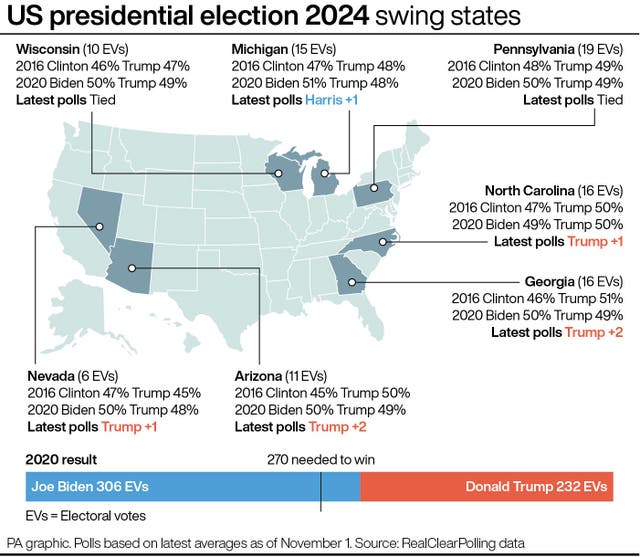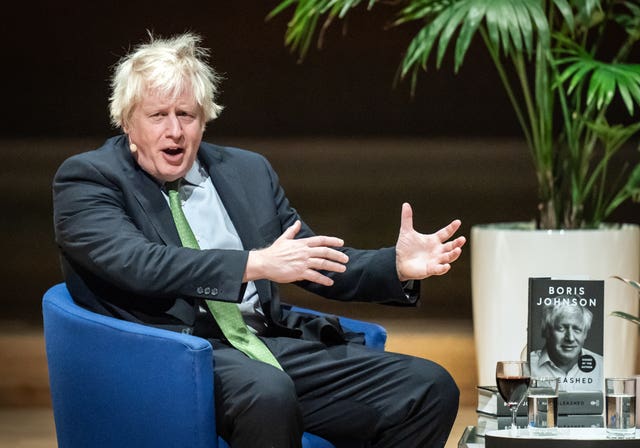Voting has ended in several key US states, as Donald Trump and Kamala Harris vie to the be next American president.
Both candidates were predicted to win in reliably Republican and Democrat states as the first results came in. The Associated Press called Mr Trump to win in Kentucky, Indiana and West Virginia, and Ms Harris in Vermont.
Former president Mr Trump appeared ahead in the early hours of the race, with predicted wins in Florida, Tennessee and other solidly red states outnumbering Ms Harris’ in Maryland, Massachusetts, Connecticut and others.
Crucial battleground states of Georgia, Pennsylvania and North Carolina are yet to be called.
If the results of voting follow AP’s predictions, Mr Trump will have gained 95 votes in the electoral college, and Ms Harris 35.
Under the US voting system, a total of 270 votes in the college are needed to win the presidency.
The election has largely unfolded smoothly across the USA, despite some voters suffering delays in casting their ballots, and a spate of what the FBI described as non-credible bomb threats.
The economy – and reducing inflation – is a key issue for Americans according to exit polling, but other areas of concern for voters are security on the US’s southern border with Mexico, protecting democracy and abortion rights.
As they take part in the presidential poll, 10 states across the US will vote on whether to enshrine the right to abortion in law.
The neck-and-neck race will have a sweeping impact on global politics, including in the UK where Sir Keir Starmer’s Government may have to grapple with upheaval in America’s security and defence approach if Mr Trump wins.
The Government has been working hard to win over the Republican candidate in case he is re-elected, after a trans-Atlantic spat developed in recent weeks over Labour Party volunteers heading to the US to campaign for his rival.

Sir Keir is expected to be following the results of the US election, but his official spokesman did not say whether the Prime Minister would be staying up overnight to watch the results roll in.
Some Cabinet ministers have in the past made scathing criticisms of Mr Trump while Labour was in opposition, including Health Secretary Wes Streeting, who in 2017 called Mr Trump an “odious, sad, little man” in a social media post.
Though Labour and Mr Trump “may not be ideological bedfellows”, if he is elected “there will be a really good working relationship”, the Health Secretary told LBC.
The Republican candidate would likely chart a new US course on major conflicts in Ukraine and the Middle East, areas where Sir Keir has largely followed the lead of US President Joe Biden.
Former Conservative prime minister Boris Johnson has voiced concerns about what the result might mean for global affairs, telling Channel 4 News: “The thing that really worries me right now is Ukraine and the future of democracy in that country.
“I think there is a risk whatever happens in this election that there will be a disaster in Ukraine.”

In central London, Democrat supporters living in the UK appeared confident their efforts to “get out the vote” of Americans overseas was “second to none”.
Democrats Abroad UK chair Kristin Wolfe told PA: “This is happening all over the world – we are turning out overseas voters.
“We’re going to win this thing.”
Chairman of the Republicans Overseas UK group Greg Swenson meanwhile told the PA news agency there is “considerable optimism” over a Trump victory.
Mr Swenson added: “For the first time we have embraced mail-in and early voting and it’s paid off.
“It’s still too close to call, but we feel voters will choose prosperity and security through common sense over the negative outcomes of the left’s radical progressive agenda.”
So-called swing states such as Arizona, Georgia and Pennsylvania – where the results will be close – are the areas where the Democrats and Republicans have focused their campaigning in recent days.




Why are you making commenting on The Herald only available to subscribers?
It should have been a safe space for informed debate, somewhere for readers to discuss issues around the biggest stories of the day, but all too often the below the line comments on most websites have become bogged down by off-topic discussions and abuse.
heraldscotland.com is tackling this problem by allowing only subscribers to comment.
We are doing this to improve the experience for our loyal readers and we believe it will reduce the ability of trolls and troublemakers, who occasionally find their way onto our site, to abuse our journalists and readers. We also hope it will help the comments section fulfil its promise as a part of Scotland's conversation with itself.
We are lucky at The Herald. We are read by an informed, educated readership who can add their knowledge and insights to our stories.
That is invaluable.
We are making the subscriber-only change to support our valued readers, who tell us they don't want the site cluttered up with irrelevant comments, untruths and abuse.
In the past, the journalist’s job was to collect and distribute information to the audience. Technology means that readers can shape a discussion. We look forward to hearing from you on heraldscotland.com
Comments & Moderation
Readers’ comments: You are personally liable for the content of any comments you upload to this website, so please act responsibly. We do not pre-moderate or monitor readers’ comments appearing on our websites, but we do post-moderate in response to complaints we receive or otherwise when a potential problem comes to our attention. You can make a complaint by using the ‘report this post’ link . We may then apply our discretion under the user terms to amend or delete comments.
Post moderation is undertaken full-time 9am-6pm on weekdays, and on a part-time basis outwith those hours.
Read the rules here